Roseberry's eye: 60 years behind the lens
-
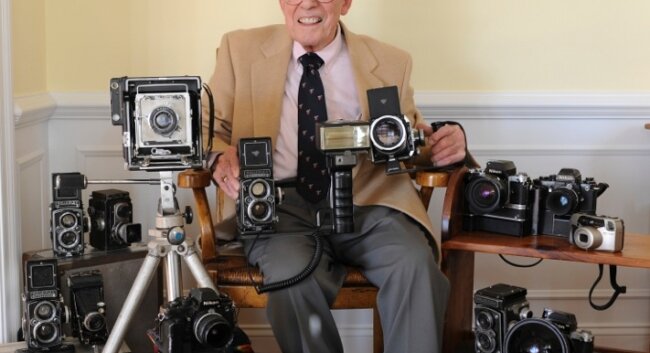 Ed Roseberry with the tools of his trade, 2013.photo by Steve Trumbull
Ed Roseberry with the tools of his trade, 2013.photo by Steve Trumbull -
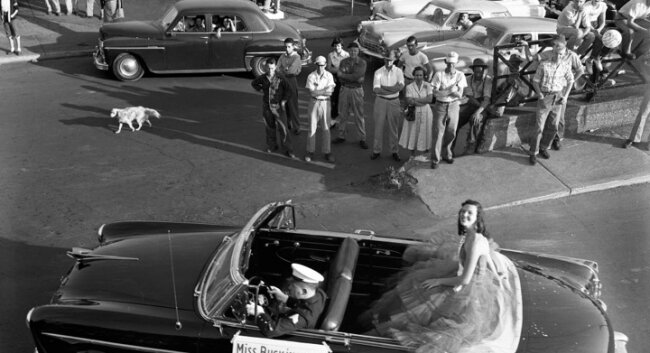 Apple Harvest Festival Parade, Downtown Charlottesville, Early 1950s. Roseberry shot this from the roof of the porte-cochere of East End Gulf, hollering down at the Beauty Queen to get her attention.Ed Roseberry
Apple Harvest Festival Parade, Downtown Charlottesville, Early 1950s. Roseberry shot this from the roof of the porte-cochere of East End Gulf, hollering down at the Beauty Queen to get her attention.Ed Roseberry -
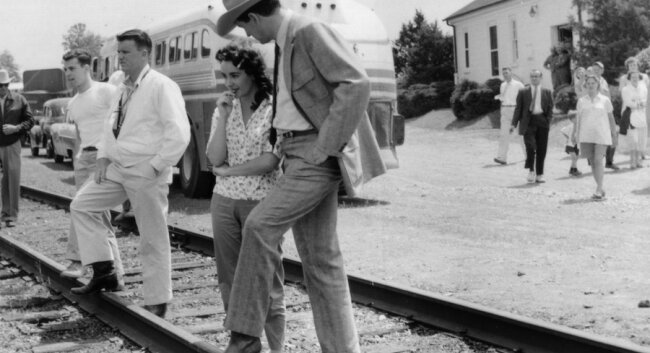 Rock Hudson, then 30, takes a break from filming "Giant" at the Keswick railroad depot. Taylor, age 23, wasn't in the scene, as she is captured out of costume with her hair in curlers.Ed Roseberry
Rock Hudson, then 30, takes a break from filming "Giant" at the Keswick railroad depot. Taylor, age 23, wasn't in the scene, as she is captured out of costume with her hair in curlers.Ed Roseberry -
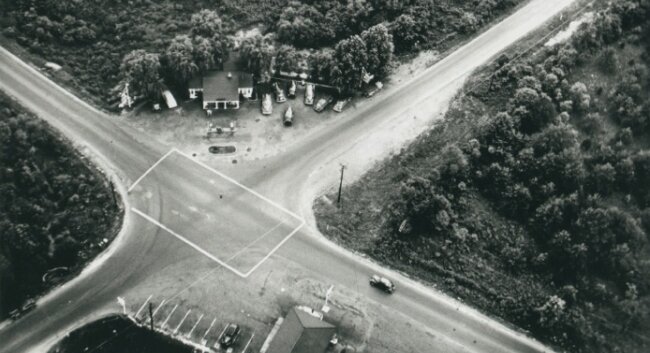 Intersection of Emmet St. and Barracks Road, July 1948. Roseberry's first aerial shot, with brother, Bob, flying the plane. You can see Carroll's Tea Room.Ed Roseberry
Intersection of Emmet St. and Barracks Road, July 1948. Roseberry's first aerial shot, with brother, Bob, flying the plane. You can see Carroll's Tea Room.Ed Roseberry -
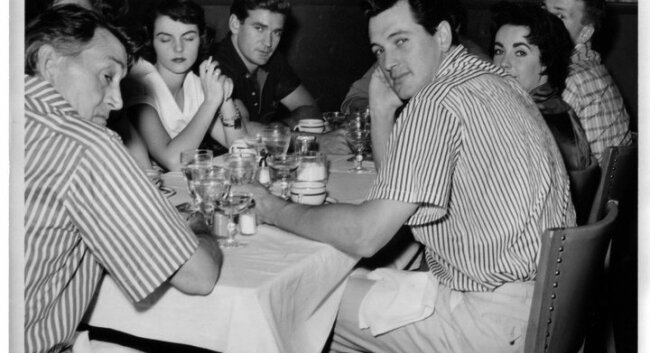 Roseberry surprises the cast of "Giant" at the Thomas Jefferson Inn: Hudson and Elizabeth Taylor at right, Rod Taylor center, and Paul Fix, best known as the marshal on "The Rifleman", at left.Ed Roseberry
Roseberry surprises the cast of "Giant" at the Thomas Jefferson Inn: Hudson and Elizabeth Taylor at right, Rod Taylor center, and Paul Fix, best known as the marshal on "The Rifleman", at left.Ed Roseberry -
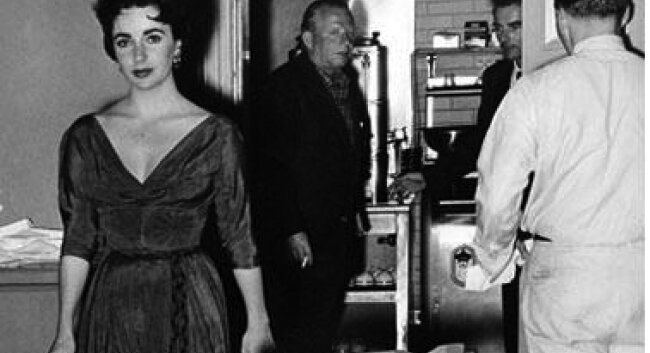 Elizabeth Taylor during the filming of "Giant" with Montgomery Cliff in the background. Roseberry never saw Cliff, who was not in the film, but he heard him after the shot. "Somebody kill that son-of-a-bitch," he shouted at Roseberry.Ed Roseberry
Elizabeth Taylor during the filming of "Giant" with Montgomery Cliff in the background. Roseberry never saw Cliff, who was not in the film, but he heard him after the shot. "Somebody kill that son-of-a-bitch," he shouted at Roseberry.Ed Roseberry -
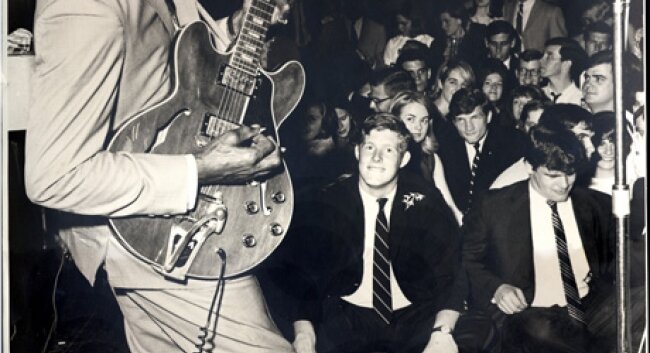 Chuck Berry at Memorial Gym in 1965.Ed Roseberry
Chuck Berry at Memorial Gym in 1965.Ed Roseberry -
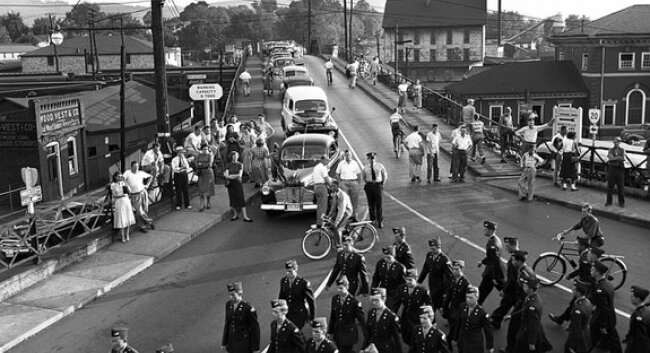 Apple Harvest Festival parade on the old Belmont Bridge, 1951.Ed Roseberry
Apple Harvest Festival parade on the old Belmont Bridge, 1951.Ed Roseberry -
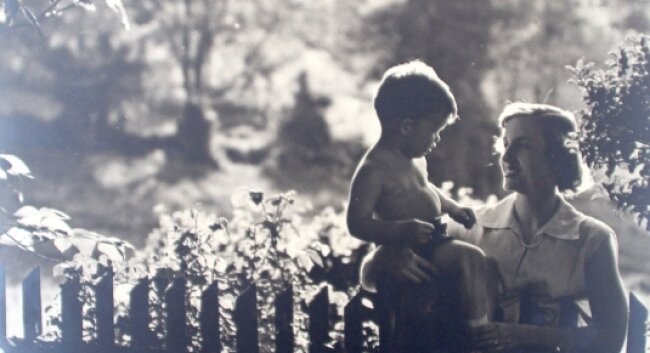 This is one of Roseberry's earliest efforts, a shot of his first wife and son in 1952.Ed Roseberry
This is one of Roseberry's earliest efforts, a shot of his first wife and son in 1952.Ed Roseberry -
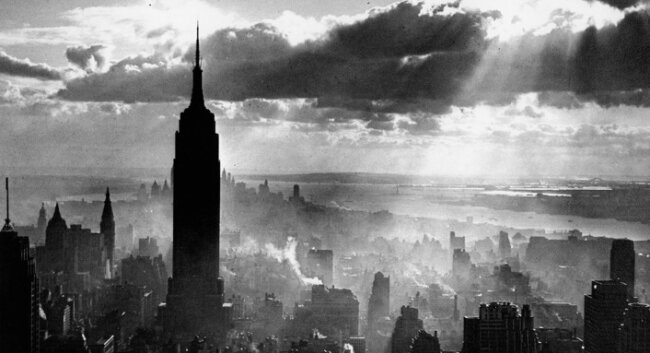 This 1952 shot of the New York City skyline, taken from the RCA Building, won Roseberry a national award and got a two-page spread in "Photography Magazine."Ed Roseberry
This 1952 shot of the New York City skyline, taken from the RCA Building, won Roseberry a national award and got a two-page spread in "Photography Magazine."Ed Roseberry -
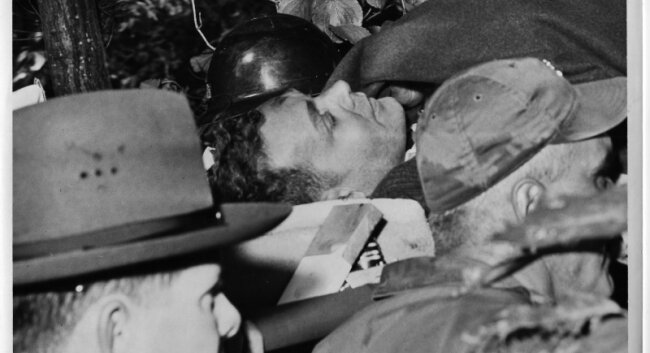 Phil Bradley survived the crash of flight 349 in 1959, and Roseberry was there to to shoot the rescue.Ed Roseberry
Phil Bradley survived the crash of flight 349 in 1959, and Roseberry was there to to shoot the rescue.Ed Roseberry -
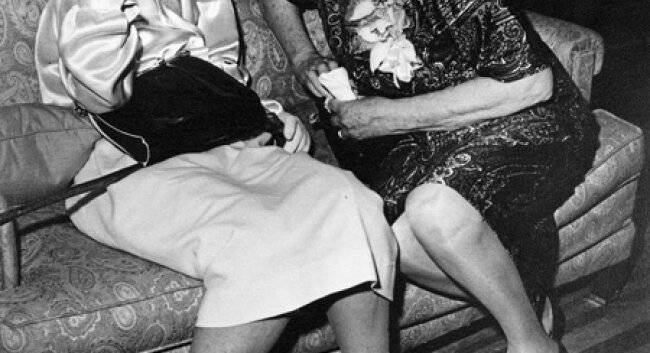 Roseberry took 4th place in a national competition for this one, a shot of two ladies at a Keswick Country Club wedding reception in 1967.Ed Roseberry
Roseberry took 4th place in a national competition for this one, a shot of two ladies at a Keswick Country Club wedding reception in 1967.Ed Roseberry -
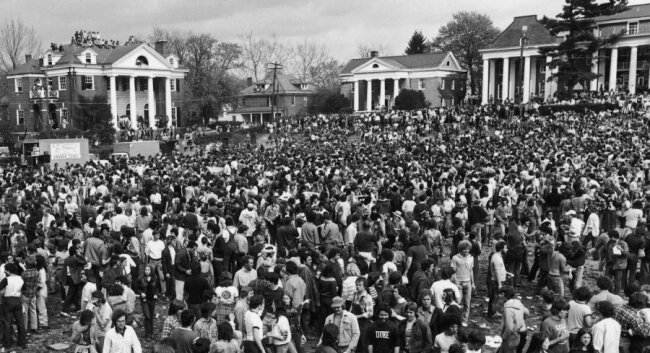 Mud-and-booze-soaked bedlam at the Mad Bowl, part of the famous "Easters" celebration at UVA, circa 1970.Ed Roseberry
Mud-and-booze-soaked bedlam at the Mad Bowl, part of the famous "Easters" celebration at UVA, circa 1970.Ed Roseberry -
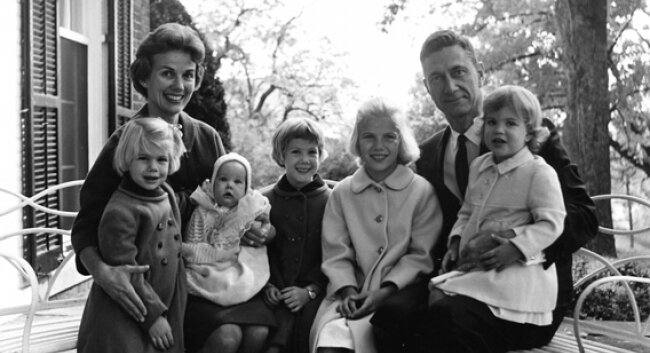 UVA President Edgar Shannon, wife Eleanor, and kids at Carr’s Hill, 1966.Ed Roseberry
UVA President Edgar Shannon, wife Eleanor, and kids at Carr’s Hill, 1966.Ed Roseberry -
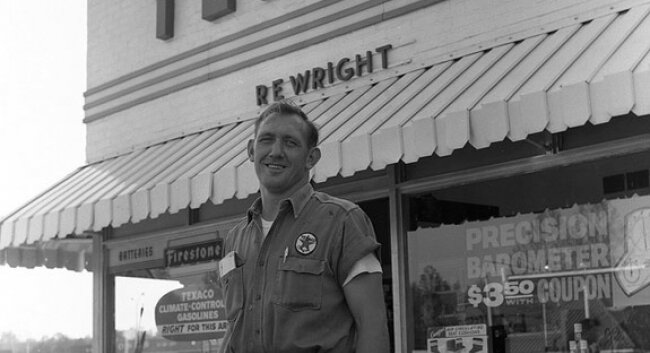 Barracks Road Texaco before the shopping center went up.Ed Roseberry
Barracks Road Texaco before the shopping center went up.Ed Roseberry -
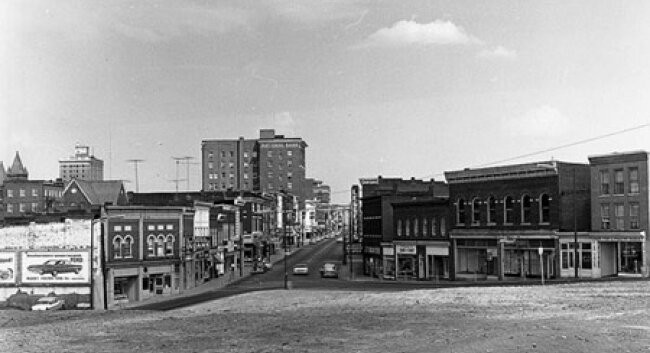 Roseberry standing where Vinegar Hill used to be, and where the Omni Hotel is now.Ed Roseberry
Roseberry standing where Vinegar Hill used to be, and where the Omni Hotel is now.Ed Roseberry -
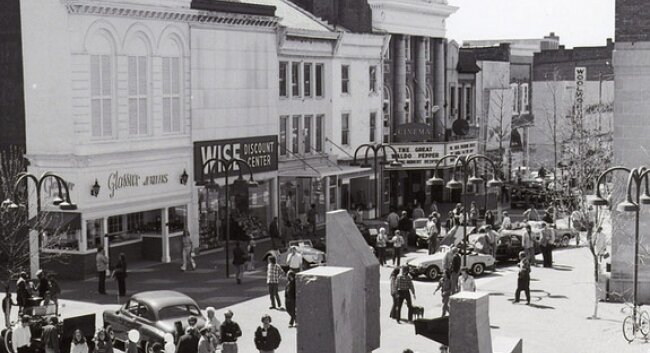 Our just-completed Downtown Mall in the mid-1970s.Ed Roseberry
Our just-completed Downtown Mall in the mid-1970s.Ed Roseberry -
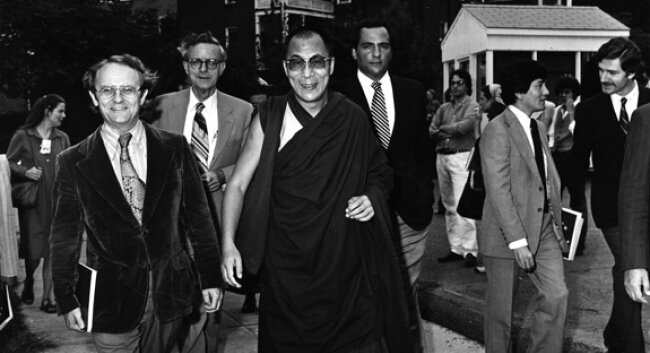 The Dalai Lama visits UVA in 1979.Ed Roseberry
The Dalai Lama visits UVA in 1979.Ed Roseberry -
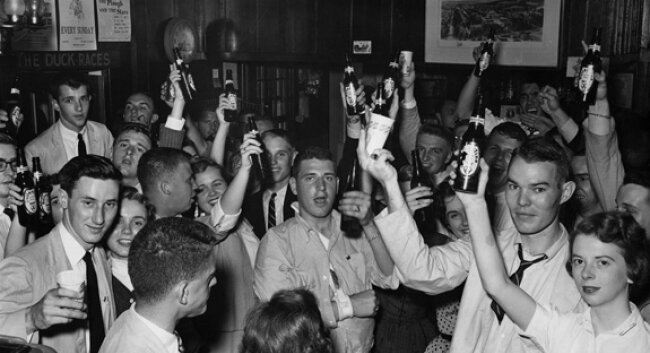 Carroll’s Tea Room in 1955, before it closed to make room for the Barracks Road Shopping Center.Ed Roseberry
Carroll’s Tea Room in 1955, before it closed to make room for the Barracks Road Shopping Center.Ed Roseberry -
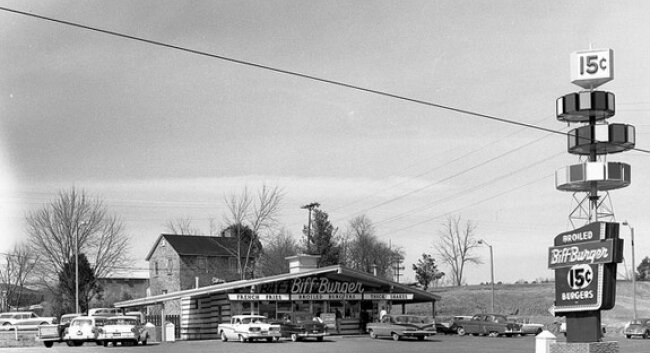 Roseberry says Biff-Burger, out past Pantops, didn't last long because it was too far out of town.Ed Roseberry
Roseberry says Biff-Burger, out past Pantops, didn't last long because it was too far out of town.Ed Roseberry -
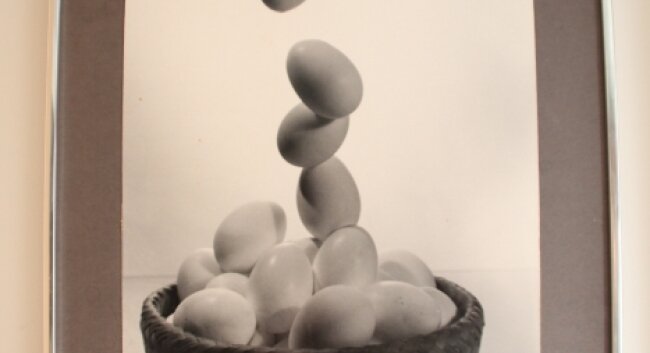 An ad Roseberry shot for Reynold's Printing Company. Piano wire (which he "painted out" of the negative") holds the eggs in place, which he drained through a pinhole in the shell.Ed Roseberry
An ad Roseberry shot for Reynold's Printing Company. Piano wire (which he "painted out" of the negative") holds the eggs in place, which he drained through a pinhole in the shell.Ed Roseberry -
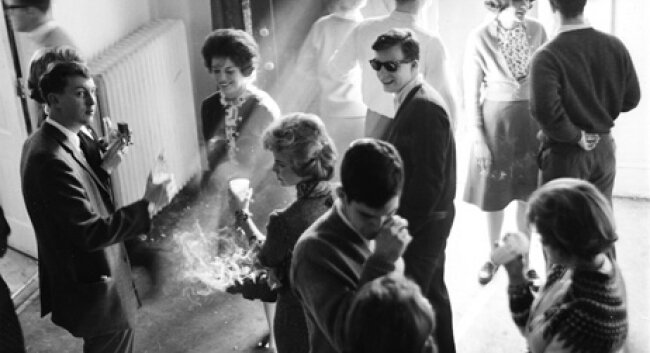 A favorite of Roseberry's, a Sunday afternoon party at ZBT in 1963.Ed Roseberry
A favorite of Roseberry's, a Sunday afternoon party at ZBT in 1963.Ed Roseberry -
 Apple Harvest Festival parade on West Main in 1952.Ed Roseberry
Apple Harvest Festival parade on West Main in 1952.Ed Roseberry -
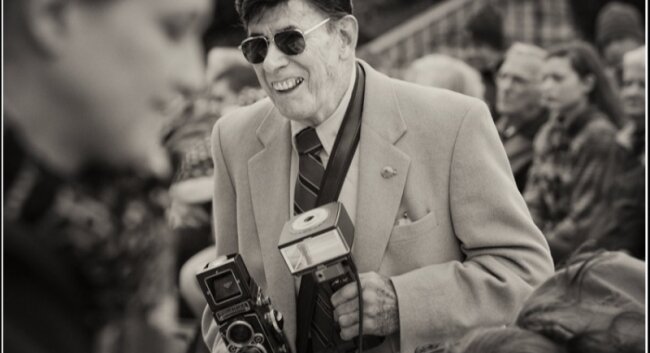 Photographer Bill Emory catches Roseberry in action at Charlottesville's 250th birthday celebration in January.Bill Emory
Photographer Bill Emory catches Roseberry in action at Charlottesville's 250th birthday celebration in January.Bill Emory
Local photographer Ed Roseberry is excited and a little anxious. After eight decades shooting film— producing an estimated 200,000 photos that have won him national awards and will soon form a special collection at UVA— he's recently made the leap to digital and has spent the last two months experimenting with his new camera, a Nikon D-7100.
"I don't know how fast I'm gonna be with this new digital," says Roseberry, sitting in the living room of the townhouse on Pantops Mountain he bought this year with a VA loan under the GI Bill, having served in the U.S. Navy during World War II. "It's kind of like learning to use a computer," he muses.
Like other great photographers whose work spans decades, Roseberry, who turns 88 on July 4, has an impressive ability to capture a moment— make that thousands of moments— as he's taken aim at subjects from a young Elizabeth Taylor during the filming of the 1956 movie Giant to one of his most recent jobs, photographing events for Charlottesville's 250th Anniversary earlier this year.
"Ed's body of work is remarkable in part because of the span of time it covers," says local photographer Steve Trumbull, who worked with Roseberry to create a narrated slide-show presentation called "Roseberry's Charlottesville," which is next scheduled to show on July 11 at C'ville Coffee.
Roseberry got his first camera as a gift from his father in 1944, soon before he headed off to war, and what started as a hobby grew into paid gigs, particularly in the 1950s, '60s and '70s, when his work attracted attention from far beyond Charlottesville's boundaries. A shot he took of the New York City skyline from the RCA building in 1952 won him a national award and a two-page spread in Photography Magazine. And a snap he took of two older ladies chatting at a wedding reception at the Keswick Country Club in 1967 won fourth place in a national snap-shot competition.
The latter award gave Roseberry and his first wife a three-week vacation to Hawaii before her premature death of breast cancer. (Remarried, Roseberry would eventually move back to the island state for 16 years after his two sons were grown, and according to Roseberry, his body of work from his time there is nearly as extensive as his Charlottesville work.)
While the national attention and income were welcome, Roseberry says his passion for photography, not financial reward, has kept him shooting year after year.
"It's an art form that I have always liked," says Roseberry," but I kept buying expensive equipment, so I had to learn to pay for it."
With a young wife and two sons to support, Roseberry, who was born in Roanoke but moved to Charlottesville with his parents at age 14, started photographing weddings and doing freelance work in the early 1950s, but he eventually took a job as an inspector with the local health department, where he worked for 33 years, using some of that income to support the expense of camera and darkroom equipment.
Those years of stretching pennies, ironically, have resulted in a body of work that essentially is priceless. The University of Virginia, Roseberry's alma mater and the subject of many of Roseberry's iconic photographs, plans to house his photographs in its special collections library. In addition, along with Trumbull's slideshow retrospective, historian and local radio host Coy Barefoot is in the midst of cataloging Roseberry's work for an online museum as part of his Virginia History Lab project.
"With some photos, I'm the only guy who knows what the hell they are," Roseberry says. "When I'm gone people will be left guessing, so I'm helping with them now."
Roseberry's work, however, is not only known locally. Eight Modern, a gallery in Santa Fe, New Mexico, has its own small trove of prints.
"His pictures have the humanism and spontaneity characteristic of good street photography," says gallery owner Margo Thoma. " The photographs he took of student life at the University of Virginia capture a very specific time and place, but there is still something universal and contemporary about the behavior and relationships he recorded."
Asked to reflect on his body of work, which chronicles enormous changes in the 20th century and beyond, from World War II to the wild 1960s, from the birth of Rock and Roll to the end of the Cold War, from typewriters to Macs, from a folding Kodak camera to a Nikon digital, Roseberry is typically modest.
"I didn't pay attention to change much," says Roseberry, "because it was a gradual thing I was living through. I got to see famous people, important people, but this is a people-people thing, and the kind of shot you get depends on how you treat people, from presidents to the man on the street."
Earlier this year, Roseberry was busy shooting Charlottesville's 250th birthday celebration with his trusty twin lens Rolleiflex, the same camera he used to shoot photos for the UVA student yearbook Corks & Curls when he was a student in 1947 and earned the nickname "Flash." He recalls taking pictures of visiting dignitaries and celebrities but also wandering around the fraternities on the weekends, capturing youthful hijinks and posting images for sale from the previous night in the window of Eljo's clothing store on Sunday mornings, where, he says, a crowd would often gather to view themselves in a moment that was so recent at the time, but which they may not have realized was already a part of history.
Indeed, Roseberry says he was well-known in Charlottesville and at the University for many years, but not so much today.
"People die off, you know," he says.
Browsing Roseberry's photographs can be an existential experience, as the iconic photos of students captured in the prime of their youth, buildings that no longer exist or hadn't been built yet, or movie stars long gone, remind us that time may pass gradually, as Roseberry observes, but that time is also relentless in its forward progression, claiming the moments of our lives for oblivion as soon as they happen.
Maybe that's why Roseberry has found it, and still finds it, important to pay attention.
For fellow photographer Bill Emory, who captured Roseberry working Charlottesville's birthday celebration earlier this year, it's about dedication.
"I value Ed because of his dedication to place," he says, "for his craftsmanship and for creating a huge visual record."